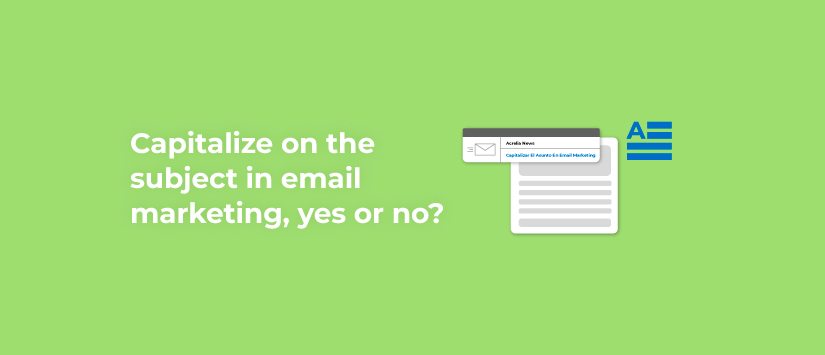Category: Email Marketing

Any small change in the subject line of an email marketing campaign can increase the percentage of open rates. That is why you have to pay attention, not only to the words you use, but also to how you write them, and one of the few options you have are capital letters, but they are a double-edged tool that must be handled with care when deciding whether or not to capitalise the subject line.
To capitalise a title is to put some words in capital letters (title case). For example: "See how we have improved our product" capitalised would be "See How We Have Improved our product" or "Buy Now And Pay Later" instead of "Buy now and pay later".
The most classic style is to capitalise only main words (nouns, verbs, adjectives, adverbs and pronouns) and lowercase secondary words (articles, prepositions and conjunctions). For example: "We have a Gift for You" or "Update Your Subscription Before the Summer".
It is worth remembering that, outside the email marketing environment, a possible use is for the whole title to be in upper case. This can be useful in posters and materials where a sentence needs to stand out visually, but in the online world it is discouraged so that it doesn't look like we are shouting at the user to do something.
Excessive use of capital letters can cause the message to be considered spam and be filtered by email managers. Also, if they are mixed without apparent meaning in the same word, for example: "ThERe’S AnD OFFeR WaiTInG fOr yOu ". This is distracting and difficult to read, so it is a bad resource.
Whatever the case, the decision on how to apply capital letters should be reflected in the style guide to be consistent in email messages and any other marketing or communication channel.
If we understand that the subject is a title, it can be good practice to capitalise both all the words and only the main words. There are advantages to doing so:
Capitalisation is part of the brand's identity, so it must always be used in the same way so that it does not appear to be a mistake, both in e-mails and in other campaigns that are launched. In addition, it serves to organise the internal sections by marking different hierarchies in headings and subheadings, which can help the overall readability of the entire newsletter.
Capitalisation is recommended in most English-language media stylebooks, such as the New York Times or the Associated Press (AP), as well as the American Psychological Association (APA) and the American Medical Association (AMA), but the RAE does not contemplate it.
If we are interested in following the Spanish spelling, the subject should be a sentence like any other (sentence case in English), that is, with a capital letter in the first word and only in the other words that may correspond, such as proper nouns. So, if you are translating English texts, you will have to decide whether you want to be consistent in all countries or adapt to the rules of each language.
Writing like most people is a good thing because it gives a certain everyday feel to the message because we do not go beyond what is familiar to everyone. This usage, therefore, is appropriate for any profile and is the one followed in more formal sectors or in those who prefer to follow the most popular norm.
Do not miss anything from our blog and join our Telegram https://t.me/acrelianews
Haven't you tried Acrelia News yet?
If you like this post, you will like much more our email marketing tool: professional, easy to use.